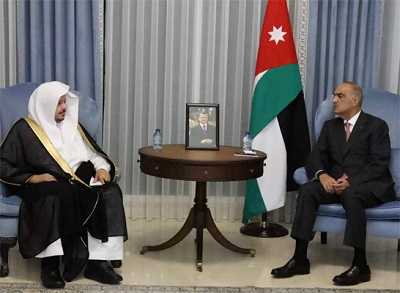Sudan: Lessons Of Revolts, Uprisings - By Ghassan Charbel, Asharq Al-Awsat
If Libya lost four decades under Colonel Muammar Gaddafi, three decades went in vain under Omar Hassan al-Bashir’s rule of Sudan. It is no exaggeration to say that Sudan, since its independence in 1956, spent those years lost between generals and uprisings, until it attained the current change, exhaustedly.
Successive revolutions and revolts drained the country’s resources and stability, shattered its unity and shrunk its map. The mastery of Sudanese parties to dispel the space of democracy perfectly matches the ability of the military to seize any chance to re-impose its grip on power and decision-making.
Only two years after the independence, the radio cut its programs and broadcast the number-one statement. The army, led by General Ibrahim Abboud, seized power and left it only after an uprising – the revolution of 1964. The parties could not organize the dance of return to democratic rule. They have long argued over the system of governance and the constitution and wasted both the time and the decision.
On May 25, 1969, the radio cut its programs again to broadcast the top news. The ship fell in the hands of a captain named Marshall Gaafar Nimeiry. During the reign of the president, the blood of Communists and Ansar was shed, in addition to the flowing river of blood in the South. Nimeiry lived long, and in those days, many parts of the world were sinking under the hats of salvaging generals. The Sudanese got tired of his face and overthrew him in a coup in 1985. The parties did not learn from previous lessons and began to argue about the system, the constitution, and the references. They disregarded a brilliant player – the Islamic Movement – which was lurking amid their confusion, waiting for the opportunity to attack. On June 30, 1989, the radio will cut its programs to broadcast the number-one news.
The country fell into the hands of a paratrooper named Omar Hassan al-Bashir. In the beginning, he hid his real identity to mislead neighboring countries and major powers. And this is what happened next.
The story is exciting. A day before the so-called "Salvation Revolution" they brought Bashir to Khartoum to meet with the supposed leader and "mentor", Dr. Hassan al-Turabi.
Turabi addressed the officer, saying: “You will go to the palace as president and I will go to prison.” He was then taken to Kober prison and the Bashir era began.
Al-Tijani al-Tayeb, a member of the Communist Party leadership, recounted how the plot was uncovered and that Uthman Omar of the Democratic Unionist Party yelled loudly from his prison cell: “This is the first time in history that the leader of the successful coup d'etat is arrested with the other detainees.” Turabi was smiling.
In prison, Turabi hid the story of the plot. He chatted with his fellow prisoners and led the prayers. But he did not veil his delight when the Soviet Union started to decline. He later expressed joy at the collapse of the “Great Satan”, in reference to the Soviet Union.
I later asked Turabi about accusations by the West that he was the spiritual mentor of Bashir’s regime. He replied: “Yes because the West knows about religion. If it enters politics, it becomes a church, and it is the pope who rules. They remember the early days when they fought it; now they want to bind Omar al-Bashir to Turabi, so they get rid of Turabi because they hate Islam, but they don’t hate the military or inherited rule.”
He continued: “They think we are a church where the pope is the decision-maker, like the pope whom they fought and drove out of power. They know nothing about our country. They did not study our history and do not know our language; we studied their history and know their religion and their language.”
Turabi’s projects were bigger than Sudan’s ability to handle them. His overwhelming presence was greater than Bashir’s tolerance. It is difficult for the president general to accept a civilian general, even if it was the man who sent him to the palace and decided to go to prison to facilitate the coup. Each of the two men went in his own way, but this time, the president did not hesitate to send the "mentor" to prison.
In 1999, I asked Bashir about accusations against Turabi. He defended him. But the days have changed. In January 2017, I met him in Riyadh during an interview with Asharq Al-Awsat. I asked him about the most difficult man he had dealt with in Sudan. He replied: “It is Hassan Abdullah al-Turabi, may God have mercy on him.”
I said that the relationship was strange. He replied: “He is a charismatic figure who has been in control of the Islamic Movement for a long time. He experienced many conflicts within the movement before he clashed with us. He was always the winner in his struggles for leadership within the movement, but he lost for the first time in his struggles with us.”
Bashir’s regime squandered three decades of Sudan’s life, at a time when the world was witnessing major transformations and scientific and technological revolutions. Bashir kept the seals, despite what happened in the south and Darfur, despite the ICC’s decision, and the seasons of dancing with terrorism.
Bashir thought that his long tenure would fortify him against any possible spring. But the story of Sudan says coups are meant to follow the path of revolutions.
Sudan turned the page of Omar al-Bashir. Now it is important to listen to people, to restore their confidence and to avoid the risk of sliding into chaos. It is time to return to the institutions and to strengthen them. It is about time parties and unions learned the lessons of the past and the military understood the same experiences. Sudan needs stability that is protected by the will of its citizens and a government that seeks to compensate for what has been lost, a government that cares about the problems of poverty, unemployment, and education.
Sudan needs to draw lessons from the successive coups and uprisings.
Latest News
 King, Bahrain monarch stress need to maintain Arab coordination
King, Bahrain monarch stress need to maintain Arab coordination Security Council to vote Thursday on Palestinian state UN membership
Security Council to vote Thursday on Palestinian state UN membership Dubai reels from floods chaos after record rains
Dubai reels from floods chaos after record rains Khasawneh, Saudi Shura Council speaker discuss bilateral ties, regional developments
Khasawneh, Saudi Shura Council speaker discuss bilateral ties, regional developments Egyptian Foreign Minister condemns potential Palestinian displacement as 'war crime'
Egyptian Foreign Minister condemns potential Palestinian displacement as 'war crime'
Most Read Articles
- Jordan urges UN to recognise Palestine as state
- Senate president, British ambassador discuss strategic partnership, regional stability
- Temperatures to near 40 degree mark next week in Jordan
- JAF carries out seven more airdrops of aid into Gaza
- Safadi, Iranian counterpart discuss war on Gaza, regional escalation
- UN chief warns Mideast on brink of ‘full-scale regional conflict’
- Google fires 28 employees for protesting $1.2 billion cloud deal with “Israeli” army
- US vetoes Security Council resolution on full Palestinian UN membership
- Biden urges Congress to pass 'pivotal' Ukraine, Israel war aid
- Israeli Occupation strike inside Iran responds to Tehran's provocation, reports say